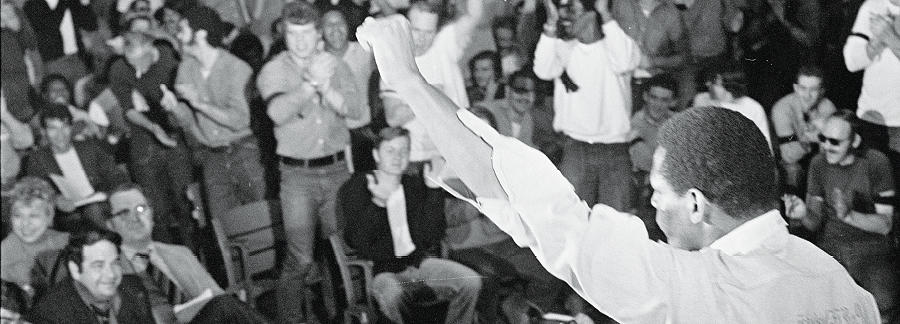Date:
Location:
ABOLITION
Thursday, March 23 - Friday, March 24, 2023
In the fall of 1972, the men incarcerated at the state prison in Walpole, Massachusetts organized themselves into a labor union—the National Prisoners Reform Association (NPRA). In March of 1973, when Walpole’s guards went on strike, the NPRA took over the prison and ran it peacefully for two months. Seizing on the opportunities provided by the guards’ strike and by a radical new Commissioner of Correction, Walpole’s prisoners launched an extraordinary struggle for self-determination and an important chapter in the movement for prison abolition.
Marking the 50th anniversary of these events, this symposium brings together the people who made them happen. Panels will include former members of the NPRA and other prison organizations, colleagues of commissioner-turned-abolitionist John O. Boone, and civilian observers. It will also bring a new generation of abolitionist activists into conversation with these speakers.
Schedule for Day 1 (Thursday, March 23)
7:00 – 9:00 PM | Documentary Screening and Discussion: 3000 Years and Life (1973), directed by Randall Conrad and Stephen Ujlaki
Bobby Dellelo, NPRA President (1973)
Rev. Edward Rodman, Ad Hoc Committee and NPRA External Board Member (1973)
Albert Brown, NPRA and BANTU Board Member (1973)
Moderator: Keith Harvey, Northeast Regional Director, American Friends Service Committee
Schedule for Day 2 (Friday, March 24)
9:00 – 10:00 AM | Light Breakfast
10:00 – 11:30 AM | Black African Nations Toward Unity (BANTU): Education, Community, and Abolition
Albert Brown, NPRA and BANTU Board member (1973)
Kazi Toure, Community Activist
David Dance, Phillips Brooks House Association Volunteer (1973)
Jabir Pope, Concord Prisoners' Peaceful Movement Committee (1973)
Moderator: Margaret Burnham, University Distinguished Professor of Law, Northeastern University
1:00 PM – 2:15 PM | Blurring the Prison Wall: The NPRA, Commissioner John Boone, and Prison Abolition
Bobby Dellelo, NPRA President (1973)
Jim Isenberg, Mass. Dept. of Health and Human Services (1973)
Hon. Paul A. Chernoff (ret.), Boston College Law School
Tony Van Der Meer, Senior Lecturer in Africana Studies, UMass-Boston
Moderator: DeAnza Cook, Ph.D. Candidate in History, Harvard University
3:00 PM – 5:00 PM | Organizing and Abolition: Then and Now
Kazi Toure, Community Activist
Margaret Burnham, University Distinguished Professor of Law, Northeastern University
Rev. Edward Rodman, Ad Hoc Committee and NPRA External Board Member (1973)
Jamie Bissonette Lewey, author of When the Prisoners Ran Walpole and former chair, Maine Indian Tribal-State Commission
Andrea James, Founder and Executive Director, The National Council for Incarcerated and Formerly Incarcerated Women and Girls & Founder of Families for Justice as Healing
Moderator: Toussaint Losier, Associate Professor, W.E.B. Du Bois Department of Afro-American Studies, UMass-Amherst
Moderator: Tone the Organizer, Black Lives Matter - Boston
5:00 – 6:00 PM | Reception
All panels and symposium events will take place in the Thompson Room (Barker Center 110).
This symposium is co-sponsored by the American Friends Service Committee – Northeast Regional Office, the Committee on Degrees in History & Literature, the Edmond & Lily Safra Center for Ethics, the FXB Center for Health and Human Rights, the Harvard Prison Legal Assistance Project, the Hutchins Center for African & African American Research, the Inequality in America Initiative, the Institute to End Mass Incarceration, the Mindich Program in Engaged Scholarship, the Program in Criminal Justice Policy and Management, and the W.E.B. Du Bois Department of Afro-American Studies at UMass Amherst.
About the Series
The Abolition series examines how the humanities - history, language, storytelling, and the imagination - informs the activism and vision of movement leaders.
